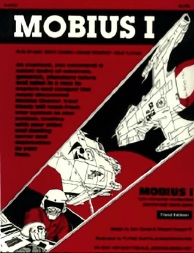Related Research Articles

A play-by-mail game is a game played through postal mail, email or other digital media. Correspondence chess and Go were among the first PBM games. Diplomacy has been played by mail since 1963, introducing a multi-player aspect to PBM games. Flying Buffalo Inc. pioneered the first commercially available PBM game in 1970. A small number of PBM companies followed in the 1970s, with an explosion of hundreds of startup PBM companies in the 1980s at the peak of PBM gaming popularity, many of them small hobby companies—more than 90 percent of which eventually folded. A number of independent PBM magazines also started in the 1980s, including The Nuts & Bolts of PBM, Gaming Universal, Paper Mayhem and Flagship. These magazines eventually went out of print, replaced in the 21st century by the online PBM journal Suspense and Decision.
Starmaster is a computer-moderated play-by-mail game that was published and administered by Schubel & Son.

The Nuts & Bolts of PBM was a magazine dedicated to play-by-mail games, first published in June 1980 as Nuts and Bolts of Starweb, and edited by Richard J. Buda. The magazine incorporated in 1983 to Bolt Publications. Rick Loomis of Flying Buffalo Games stated in 1985 that the Nuts & Bolts of PBM was the first PBM magazine not published by a PBM company. He stated that "It was a fun magazine, but somewhat ahead of its time, and it had no financial backing." Afterward, the name changed to Nuts & Bolts of Gaming.
Midgard is an open-end, medieval fantasy play-by-mail game. It was published in 1984 by Time Space Simulations. Through 1996, the game passed through more than four different publishers, including Midgard USA. As of 2022, Talisman Games is the publisher. At initial publication, Midgard was computer moderated with partial human moderation.
World conquest was a play by mail wargame published for play in 1988 by Prime Time Simulations. It was an "operational level game of land, sea and air warfare".
CTF 2187 is a closed-end, computer-moderated, play-by-mail (PBM) game that was published by Advanced Gaming Enterprises in the 1980s. It involved teams of robots, of varying size and capabilities, battling on a hex-grid arena with the purpose of defeating the opposing team or their command post. Players assumed the role of a battle robot pilot. The game was tactically-focused, with combat action beginning on the first turn. Games lasted 5–10 turns, or about six months. Players began at the rank of cadet but could spend experience points earned from a completed game to increase in rank for future games, up to the rank of General.
Infinite Conflict is a play-by-mail game that was published by Gemini Systems.
Lords of the Earth (LOTE) is a play-by-email game, first published by Thomas Harlan in 1983 during a growing era of PBM games. Initially played by postal mail, the game featured mixed moderation—computer moderated with some human assistance. By 2002, the publisher processed turns by email (PBeM). Lords of the Earth comprises multiple campaigns, each one a separate game. Campaign 1 is the oldest, set in the mid-1800s in the "Age of Air and Steam". Other campaigns begin from 2000 BCE to 1400 CE. Settings were global in scale, with one campaign featuring an outer space setting.
Schubel & Son was a hobby and gaming company that published play-by-mail (PBM) games. The company began in 1974 and expanded to large-scale PBM games in August 1978. It also published the game The Tribes of Crane in 1978, followed by StarMaster in 1980 and Global Supremacy in 1982.

Victory! The Battle for Europe is a closed-end, military strategy, play-by-mail (PBM) wargame. The game was first published by Rolling Thunder Games, Inc. in 1991 after a period of initial growth in the PBM industry. The game centers on Europe while including parts of North Africa, the Middle East, the United States, and Canada. Forty players start each game with equal resources among countries, although geography causes differences between starting positions. Games last for about three years each. The game received positive reviews and rankings in the PBM magazine Paper Mayhem in the 1990s, including tying for second place in its Best PBM Game of 1995 list.
Company Commander is a play-by-mail wargame initially published by Schubel & Son in the 1980s. Jason Oats Games is the current publisher.

Quest is an open-end, fantasy, play-by-mail (PBM) role-playing game. Initially released in the United Kingdom in 1991, by Adventures by Mail, it later became available for play in the United States, Australia, and other countries in Europe. The game has a First and Second Age, initially comprising about twenty worlds of up to 1,000 parties controlled by players. After the year 2000, the worlds consolidated into four. The current publisher is KJC Games.
Aegyptus is a computer moderated play-by-mail (PBM) game. Announced in 1984, it was published by World Campaigns
Darkworld is a roleplaying play-by-mail (PBM) game.
Rimworlds is an open-ended, science fiction, play-by-mail (PBM) game.
Terra II is a open-ended, play-by-mail (PBM) wargame published by Clemens & Associates.

Mobius I is a closed-end, space-based play-by-mail (PBM) wargame of space conquest. The game was first published in 1984 by Mobius Games and was subsequently published by Flying Buffalo, Inc. and Rick Loomis PBM Games.
Horizon's End! is a science fiction play by mail wargame published by Schubel & Son.
Conquest of Insula II is a closed-ended, computer moderated, play-by-mail (PBM) fantasy wargame.
References
- 1 2 3 4 Baldacci 1986. p. 29.
- ↑ Flagship Editors 1985. p. 39.
- 1 2 McLain 1984. p. 58.
- 1 2 3 4 Schell 1987. p. 27.
- 1 2 Schell 1987. p. 28.
- ↑ Baldacci 1986. p. 32.
- ↑ Schell 1987. p. 29.